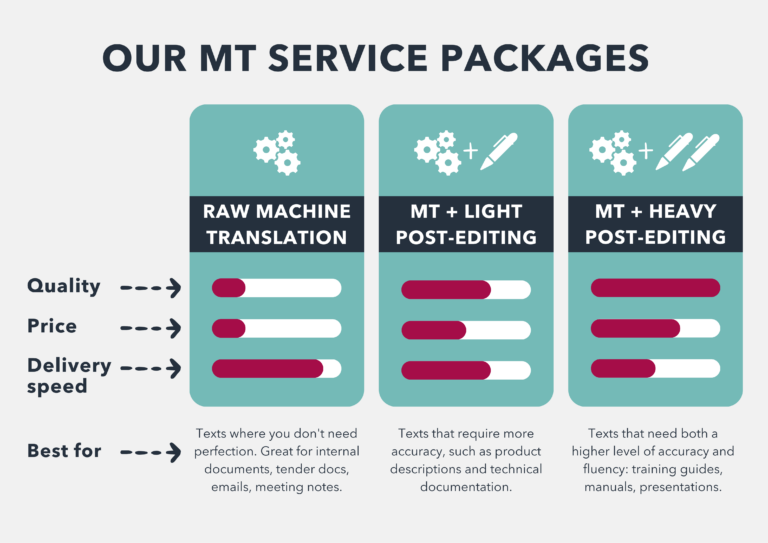MACHINE TRANSLATION SERVICES

When speed is of the essence
Are you facing tight timelines and budgets? But still looking for a way to translate your content accurately? This is where AI translation services come into play. Without compromising on quality or fluency, our machine translation packages suit a variety of needs. We offer customisable and secure machine translation that can be delivered with or without human post-editing. Our automated process makes it quick, easy, and painless to get your translated copy.
Leveraging AI to benefit your business
Dialogue’s Translation Management System platform (Phrase) comes bundled with 60+ machine translation engines to pick from, including DeepL and Microsoft Translate, each with different specialisms and strengths. Our auto-select function scans your documentation and chooses the engine(s) most suited to your subject matter and language combination. You can also attach a term base or glossary for a more personalised and consistent final output.
What are the benefits of using professional MT software instead of free MT engines?

More than just Google
Our TMS has over 60 engines to choose from and an auto-select function to help you decide on the best one.
Guaranteed Security
Unlike free MT engines, our MT software is GDPR-compliant. It keeps your content confidential and out of the public domain.
Professional advice
If you’re unsure whether machine translation is right for you, our expert linguists will guide you.

Machine Translation FAQs
Machine translation, or MT, is translation completed by computer software built from a large database of existing translations and continual input. There is an array of MT engines in the market, mainly built around neural translation technology which enables the software to analyse and translate text in context for greater accuracy. Statistical MT also forms a part of some engines, translating more on a word-for-word basis, with its strength in technical text. Click here for our webinar on machine translation.
Machine translation technology has improved immensely over the past few years, thanks mainly to advancements in neural technology. Having said this, while good for gist and many types of content, if you are looking for a 100% accurate & reliable target text, using raw machine translation is not often recommended. Post-editing by a professional linguist will improve the final flow and accuracy.
Machine translation works well for some content (e.g. for gist, internal communications and some technical texts), and not so well for other material (e.g. marketing and creative). Also, some language combinations are stronger than others. Feel free to send us the content you’d like translating and we can advise you as to whether machine translation is a suitable option or not.
We source machine translations from multiple different machine translation engines (e.g. epL, Systran, Google Translate, Microsoft Translate). We use our translation platform’s inbuilt AI to analyse the source text and select the best translation engine based on the source domain and post-editing data collated from all over the world. This allows us to get the most accurate machine translations for your project.
We use a combination of 10+ machine translation engines to provide the most accurate translations possible. Included in this is DeepL, Systran, Google Translate, Microsoft Translate, and more. These engines can be customised with specific terminology and termbases to adapt the translations to your preferences.
